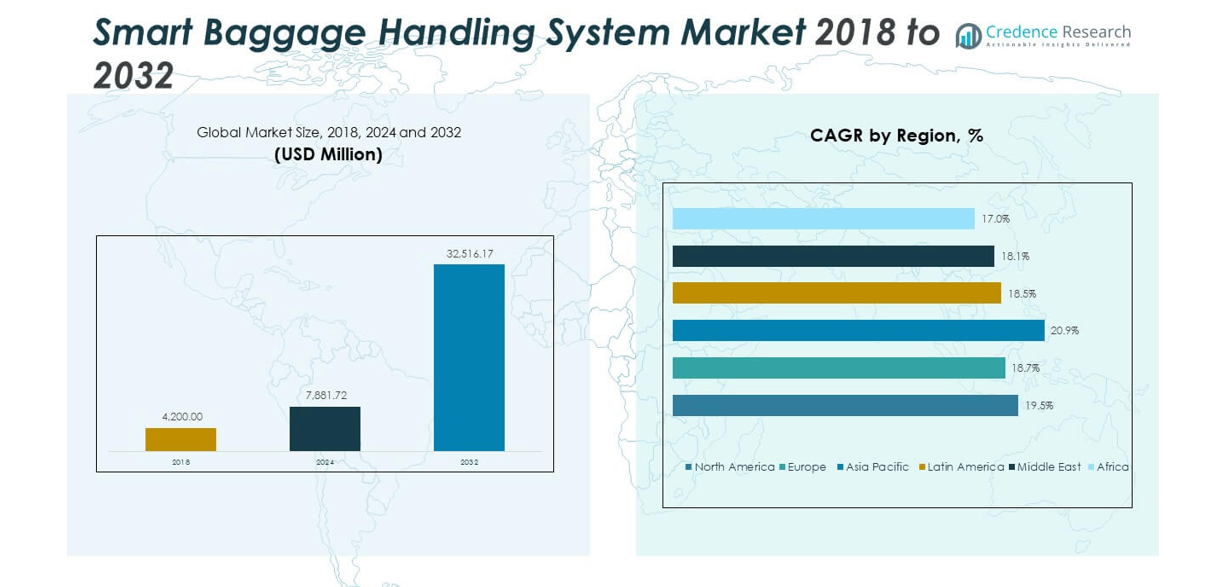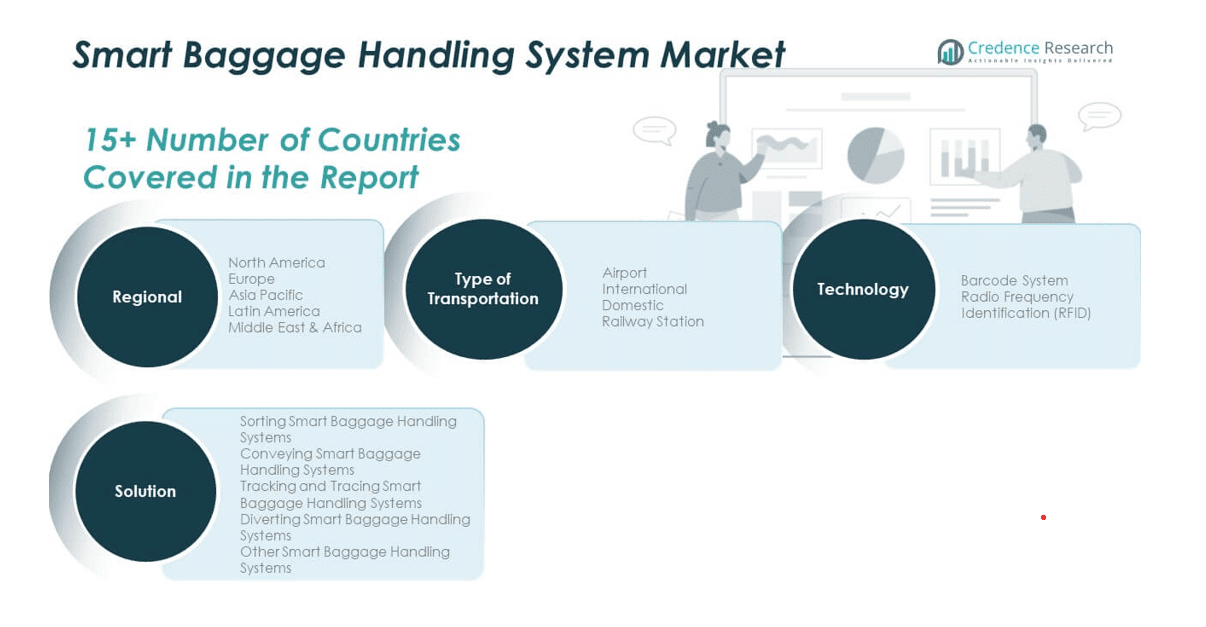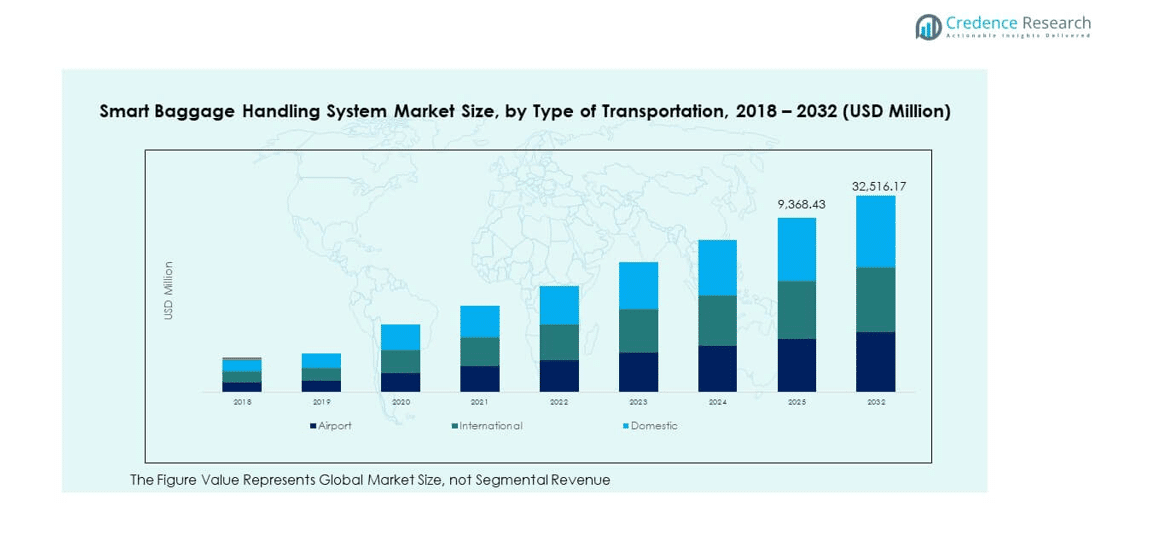CHAPTER NO. 1 : GENESIS OF THE MARKET
1.1 Market Prelude – Introduction & Scope
1.2 The Big Picture – Objectives & Vision
1.3 Strategic Edge – Unique Value Proposition
1.4 Stakeholder Compass – Key Beneficiaries
CHAPTER NO. 2 : EXECUTIVE LENS
2.1 Pulse of the Industry – Market Snapshot
2.2 Growth Arc – Revenue Projections (USD Million)
2.3. Premium Insights – Based on Primary Interviews
CHAPTER NO. 3 : SMART BAGGAGE HANDLING SYSTEM MARKET FORCES & INDUSTRY PULSE
3.1 Foundations of Change – Market Overview
3.2 Catalysts of Expansion – Key Market Drivers
3.2.1 Momentum Boosters – Growth Triggers
3.2.2 Innovation Fuel – Disruptive Technologies
3.3 Headwinds & Crosswinds – Market Restraints
3.3.1 Regulatory Tides – Compliance Challenges
3.3.2 Economic Frictions – Inflationary Pressures
3.4 Untapped Horizons – Growth Potential & Opportunities
3.5 Strategic Navigation – Industry Frameworks
3.5.1 Market Equilibrium – Porter’s Five Forces
3.5.2 Ecosystem Dynamics – Value Chain Analysis
3.5.3 Macro Forces – PESTEL Breakdown
3.6 Price Trend Analysis
3.6.1 Regional Price Trend
3.6.2 Price Trend by product
CHAPTER NO. 4 : KEY INVESTMENT EPICENTER
4.1 Regional Goldmines – High-Growth Geographies
4.2 Product Frontiers – Lucrative Product Categories
4.3 Technology Sweet Spots – Emerging Demand Segments
CHAPTER NO. 5: REVENUE TRAJECTORY & WEALTH MAPPING
5.1 Momentum Metrics – Forecast & Growth Curves
5.2 Regional Revenue Footprint – Market Share Insights
5.3 Segmental Wealth Flow – Type of Transportation & Technology Revenue
CHAPTER NO. 6 : TRADE & COMMERCE ANALYSIS
6.1. Import Analysis by Region
6.1.1. Global Smart Baggage Handling System Market Import Revenue By Region
6.2. Export Analysis by Region
6.2.1. Global Smart Baggage Handling System Market Export Revenue By Region
CHAPTER NO. 7 : COMPETITION ANALYSIS
7.1. Company Market Share Analysis
7.1.1. Global Smart Baggage Handling System Market: Company Market Share
7.2. Global Smart Baggage Handling System Market Company Revenue Market Share
7.3. Strategic Developments
7.3.1. Acquisitions & Mergers
7.3.2. New Product Launch
7.3.3. Regional Expansion
7.4. Competitive Dashboard
7.5. Company Assessment Metrics, 2024
CHAPTER NO. 8 : SMART BAGGAGE HANDLING SYSTEM MARKET – BY TYPE OF TRANSPORTATION SEGMENT ANALYSIS
8.1. Smart Baggage Handling System Market Overview by Type of Transportation Segment
8.1.1. Smart Baggage Handling System Market Revenue Share By Type of Transportation
8.2. Airport
8.3. International
8.4. Domestic
8.5. Railway Station
CHAPTER NO. 9 : SMART BAGGAGE HANDLING SYSTEM MARKET – BY TECHNOLOGY SEGMENT ANALYSIS
9.1. Smart Baggage Handling System Market Overview by Technology Segment
9.1.1. Smart Baggage Handling System Market Revenue Share By Technology
9.2. Barcode System
9.3. Radio Frequency Identification (RFID)
CHAPTER NO. 10 : SMART BAGGAGE HANDLING SYSTEM MARKET – BY END-USER SEGMENT ANALYSIS
10.1. Smart Baggage Handling System Market Overview by End-user Segment
10.1.1. Smart Baggage Handling System Market Revenue Share By End-user
10.2. Sorting Smart Baggage Handling Systems
10.3. Conveying Smart Baggage Handling Systems
10.4. Tracking and Tracing Smart Baggage Handling Systems
10.5. Diverting Smart Baggage Handling Systems
10.6. Other Smart Baggage Handling Systems
CHAPTER NO. 11 : SMART BAGGAGE HANDLING SYSTEM MARKET – REGIONAL ANALYSIS
11.1. Smart Baggage Handling System Market Overview by Region Segment
11.1.1. Global Smart Baggage Handling System Market Revenue Share By Region
11.1.3. Regions
11.1.4. Global Smart Baggage Handling System Market Revenue By Region
.1.6. Type of Transportation
11.1.7. Global Smart Baggage Handling System Market Revenue By Type of Transportation
11.1.9. Technology
11.1.10. Global Smart Baggage Handling System Market Revenue By Technology
11.1.12. End-user
11.1.13. Global Smart Baggage Handling System Market Revenue By End-user
CHAPTER NO. 12 : NORTH AMERICA SMART BAGGAGE HANDLING SYSTEM MARKET – COUNTRY ANALYSIS
12.1. North America Smart Baggage Handling System Market Overview by Country Segment
12.1.1. North America Smart Baggage Handling System Market Revenue Share By Region
12.2. North America
12.2.1. North America Smart Baggage Handling System Market Revenue By Country
12.2.2. Type of Transportation
12.2.3. North America Smart Baggage Handling System Market Revenue By Type of Transportation
12.2.4. Technology
12.2.5. North America Smart Baggage Handling System Market Revenue By Technology
2.2.6. End-user
12.2.7. North America Smart Baggage Handling System Market Revenue By End-user
2.3. U.S.
12.4. Canada
12.5. Mexico
CHAPTER NO. 13 : EUROPE SMART BAGGAGE HANDLING SYSTEM MARKET – COUNTRY ANALYSIS
13.1. Europe Smart Baggage Handling System Market Overview by Country Segment
13.1.1. Europe Smart Baggage Handling System Market Revenue Share By Region
13.2. Europe
13.2.1. Europe Smart Baggage Handling System Market Revenue By Country
13.2.2. Type of Transportation
13.2.3. Europe Smart Baggage Handling System Market Revenue By Type of Transportation
13.2.4. Technology
13.2.5. Europe Smart Baggage Handling System Market Revenue By Technology
13.2.6. End-user
13.2.7. Europe Smart Baggage Handling System Market Revenue By End-user
13.3. UK
13.4. France
13.5. Germany
13.6. Italy
13.7. Spain
13.8. Russia
13.9. Rest of Europe
CHAPTER NO. 14 : ASIA PACIFIC SMART BAGGAGE HANDLING SYSTEM MARKET – COUNTRY ANALYSIS
14.1. Asia Pacific Smart Baggage Handling System Market Overview by Country Segment
14.1.1. Asia Pacific Smart Baggage Handling System Market Revenue Share By Region
14.2. Asia Pacific
14.2.1. Asia Pacific Smart Baggage Handling System Market Revenue By Country
14.2.2. Type of Transportation
14.2.3. Asia Pacific Smart Baggage Handling System Market Revenue By Type of Transportation
14.2.4. Technology
14.2.5. Asia Pacific Smart Baggage Handling System Market Revenue By Technology
14.2.5. End-user
14.2.7. Asia Pacific Smart Baggage Handling System Market Revenue By End-user
14.3. China
14.4. Japan
14.5. South Korea
14.6. India
14.7. Australia
14.8. Southeast Asia
14.9. Rest of Asia Pacific
CHAPTER NO. 15 : LATIN AMERICA SMART BAGGAGE HANDLING SYSTEM MARKET – COUNTRY ANALYSIS
15.1. Latin America Smart Baggage Handling System Market Overview by Country Segment
15.1.1. Latin America Smart Baggage Handling System Market Revenue Share By Region
15.2. Latin America
15.2.1. Latin America Smart Baggage Handling System Market Revenue By Country
15.2.2. Type of Transportation
15.2.3. Latin America Smart Baggage Handling System Market Revenue By Type of Transportation
15.2.4. Technology
15.2.5. Latin America Smart Baggage Handling System Market Revenue By Technology
15.2.6. End-user
15.2.7. Latin America Smart Baggage Handling System Market Revenue By End-user
15.3. Brazil
15.4. Argentina
15.5. Rest of Latin America
CHAPTER NO. 16 : MIDDLE EAST SMART BAGGAGE HANDLING SYSTEM MARKET – COUNTRY ANALYSIS
16.1. Middle East Smart Baggage Handling System Market Overview by Country Segment
16.1.1. Middle East Smart Baggage Handling System Market Revenue Share By Region
16.2. Middle East
16.2.1. Middle East Smart Baggage Handling System Market Revenue By Country
16.2.2. Type of Transportation
16.2.3. Middle East Smart Baggage Handling System Market Revenue By Type of Transportation
16.2.4. Technology
16.2.5. Middle East Smart Baggage Handling System Market Revenue By Technology
16.2.6. End-user
16.2.7. Middle East Smart Baggage Handling System Market Revenue By End-user
16.3. GCC Countries
16.4. Israel
16.5. Turkey
16.6. Rest of Middle East
CHAPTER NO. 17 : AFRICA SMART BAGGAGE HANDLING SYSTEM MARKET – COUNTRY ANALYSIS
17.1. Africa Smart Baggage Handling System Market Overview by Country Segment
17.1.1. Africa Smart Baggage Handling System Market Revenue Share By Region
17.2. Africa
17.2.1. Africa Smart Baggage Handling System Market Revenue By Country
17.2.2. Type of Transportation
17.2.3. Africa Smart Baggage Handling System Market Revenue By Type of Transportation
17.2.4. Technology
17.2.5. Africa Smart Baggage Handling System Market Revenue By Technology
17.2.6. End-user
17.2.7. Africa Smart Baggage Handling System Market Revenue By End-user
17.3. South Africa
17.4. Egypt
17.5. Rest of Africa
CHAPTER NO. 18 : COMPANY PROFILES
18.1. Siemens AG
18.1.1. Company Overview
18.1.2. Product Portfolio
18.1.3. Financial Overview
18.1.4. Recent Developments
18.1.5. Growth Strategy
18.1.6. SWOT Analysis
18.2. Vanderlande Industries B.V.
18.3. Daifuku Co., Ltd.
18.4. BEUMER Group
18.5. Honeywell International Inc.
18.6. Alstef Group SAS
18.7. Pteris Global Limited
18.8. Lyngsoe Systems AS
18.9. FIVES Group
18.10. G&S Airport Conveyor
18.11 Logplan LLC
18.12. Smiths Detection Group Ltd.
18.13. ADB Safegate BV






